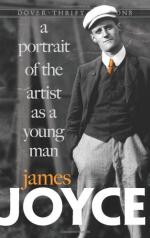The rain-laden trees of the avenue evoked in him, as always, memories of the girls and women in the plays of Gerhart Hauptmann; and the memory of their pale sorrows and the fragrance falling from the wet branches mingled in a mood of quiet joy. His morning walk across the city had begun, and he foreknew that as he passed the sloblands of Fairview he would think of the cloistral silver-veined prose of Newman; that as he walked along the North Strand Road, glancing idly at the windows of the provision shops, he would recall the dark humour of Guido Cavalcanti and smile; that as he went by Baird’s stonecutting works in Talbot Place the spirit of Ibsen would blow through him like a keen wind, a spirit of wayward boyish beauty; and that passing a grimy marine dealer’s shop beyond the Liffey he would repeat the song by Ben Jonson which begins:
I was not wearier where I lay.
His mind when wearied of its search for the essence of beauty amid the spectral words of Aristotle or Aquinas turned often for its pleasure to the dainty songs of the Elizabethans. His mind, in the vesture of a doubting monk, stood often in shadow under the windows of that age, to hear the grave and mocking music of the lutenists or the frank laughter of waist-coateers until a laugh too low, a phrase, tarnished by time, of chambering and false honour stung his monkish pride and drove him on from his lurking-place.
The lore which he was believed to pass his days brooding upon so that it had rapt him from the companionship of youth was only a garner of slender sentences from Aristotle’s poetics and psychology and a synopsis PHILOSOPHIAE SCHOLASTICAE ad MENTEM divi Thomae. His thinking was a dusk of doubt and self-mistrust, lit up at moments by the lightnings of intuition, but lightnings of so clear a splendour that in those moments the world perished about his feet as if it had been fire-consumed; and thereafter his tongue grew heavy and he met the eyes of others with unanswering eyes, for he felt that the spirit of beauty had folded him round like a mantle and that in revery at least he had been acquainted with nobility. But when this brief pride of silence upheld him no longer he was glad to find himself still in the midst of common lives, passing on his way amid the squalor and noise and sloth of the city fearlessly and with a light heart.
Near the hoardings on the canal he met the consumptive man with the doll’s face and the brimless hat coming towards him down the slope of the bridge with little steps, tightly buttoned into his chocolate overcoat, and holding his furled umbrella a span or two from him like a divining rod. It must be eleven, he thought, and peered into a dairy to see the time. The clock in the dairy told him that it was five minutes to five but, as he turned away, he heard a clock somewhere near him, but unseen, beating eleven strokes in swift precision. He laughed as he heard it for it made him think of McCann, and he saw him a squat figure in a shooting jacket and breeches and with a fair goatee, standing in the wind at Hopkins’ corner, and heard him say:




